Marine Biology with Oceanography
UCAS code C1F7
- Study mode
- Full-time
- Duration
- 3 years
- Start date and application deadlines
-
- Start date
UCAS code C1F7
From microscopic algae to giant whales, most of our planet’s life is found in the oceans. As a marine biologist, you will learn about the behaviour, physiology, and ecology of marine organisms.
Life first emerged in the ocean and has spread throughout this dynamic environment. The distribution, growth and success of marine organisms is affected by the interaction of biological, chemical and physical processes operating in the ocean.
You will discover how individuals, populations and communities respond to environmental drivers such as temperature and food availability, as well as to the challenges presented by a changing climate and human interaction. You will also gain the varied skills necessary to examine the marine environment and relay your findings to audiences from the general public through to government bodies.
You will study the interaction between the biology of marine organisms, the composition and properties of seawater and the physical processes operating in the oceans.
There is a strong emphasis on marine sustainability and ecosystem management, marine biogeochemistry, the climate system and numerical skills. Training at sea, in the field, and in the laboratory in years one, two and three will provide you with the essential skills required to be a successful marine scientist including practical experience of data collection and processing, analysis and interpretation.
A number of the School’s degree programmes involve laboratory and field work. Fieldwork is carried out in various locations, ranging from inner city to coastal and mountainous environments. We consider applications from prospective disabled students on the same basis as all other students, and reasonable adjustments will be considered to address barriers to access.
Our degree is one of only a handful in the UK to be accredited by the Institute of Marine Engineering, Science and Technology (IMAREST), opening up opportunities for students and graduates of our programmes.
IMarEST - The Institute of Maring Engineering, Science and Techonology - is the international professional body for all marine professionals.

We’re proud to announce we’ve been awarded a Gold rating for educational excellence.
Discover what you'll learn, what you'll study, and how you'll be taught and assessed.
The required modules in year one provide grounding in ocean sciences and marine biology, as well as developing essential and transferrable skills. Optional modules are available in biology and ecology. There are fieldwork opportunities in ocean sciences and marine biology in year one.
Students will be pre-registered for ENVS128 Quantitative Skills for Ecology and Marine Biology. Students wanting to take a more advanced maths module can switch to ENVS117 Essential Mathematical Skills.
| Optional modules | Credits |
|---|---|
| ESSENTIAL MATHS (ENVS117) | 15 |
| LIVING WITH ENVIRONMENTAL CHANGE (ENVS119) | 15 |
| ECOLOGY AND CONSERVATION (ENVS157) | 15 |
| INTRODUCTION TO CLIMATE CHANGE AND MITIGATION (ENVS189) | 15 |
Programme details and modules listed are illustrative only and subject to change.
In year two, there is an emphasis on the development of practical, analytical and numerical skills through training in fieldwork, laboratory skills and practical oceanography. There is an opportunity for students to be trained in the industry standard software used in ocean sciences, Matlab, or R software used in much of the biological sciences.
There are fieldwork opportunities in ocean sciences and marine biology in year two.
Programme details and modules listed are illustrative only and subject to change.
In year three, there is an emphasis on the development of skills in research and critical analysis through the independent research project and tutorials covering current hot topics in ocean and climate sciences. Students are introduced to the fundamentals of the global carbon cycle and select options to suite their interests in either marine biology or ocean sciences.
There are fieldwork opportunities in ocean sciences and marine biology in year three.
| Compulsory modules | Credits |
|---|---|
| OCEAN CARBON AND CLIMATE (ENVS335) | 15 |
| SEA PRACTICAL (ENVS349) | 30 |
| INDEPENDENT RESEARCH PROJECT (ENVS306) | 30 |
Programme details and modules listed are illustrative only and subject to change.
Teaching strategies include a mix of lectures, tutorials, workshops, field classes, research vessel cruises, laboratory work, computer sessions, group projects and individual work under supervision. You will typically receive around 15 hours of formal teaching each week, as well as about 60 hours of residential and/or field days each year. You will study four modules per semester. A module might involve two one-hour lectures each week, and a laboratory or computer-based practical as well. Tutorials are an integral part of our approach, involving groups of 5-7 students meeting regularly with a member of academic staff to discuss study skills, careers, current research and topical issues.
As you progress through your degree, you are increasingly challenged to engage with current debates, to think critically and to study independently. You will do an ‘Honours Project’ throughout year three, which is a piece of independent research (field, lab or data analysis) on a topic of your choice, supervised by a member of academic staff. If you opt for the four-year integrated master’s programmes, you will spend 50% of your final year on a master’s project working closely within a research group on an area which may well generate publishable results.
A number of the School’s degree programmes involve laboratory and field work. The field work is carried out in various locations, ranging from inner city to coastal and mountainous environments. We consider applications from prospective students with disabilities on the same basis as all other students, and reasonable adjustments will be considered to address barriers to access.
Assessment matches the learning objectives for each module and may take the form of written exams, coursework submissions in the form of essays, scientific papers, briefing notes or lab notebooks, oral and poster presentations and contributions to group projects. Coursework is designed around the types of problems encountered, and the skills needed, in commercial, research and public sector jobs. Emphasis is placed on good laboratory practice and maintaining useful lab notebooks in the context of scientific integrity and scientific data management.
We have a distinctive approach to education, the Liverpool Curriculum Framework, which focuses on research-connected teaching, active learning, and authentic assessment to ensure our students graduate as digitally fluent and confident global citizens.
The Liverpool Curriculum framework sets out our distinctive approach to education. Our teaching staff support our students to develop academic knowledge, skills, and understanding alongside our graduate attributes:
Our curriculum is characterised by the three Liverpool Hallmarks:
All this is underpinned by our core value of inclusivity and commitment to providing a curriculum that is accessible to all students.
The qualifications and exam results you'll need to apply for this course.
| Qualification | Details |
|---|---|
| A levels |
BBC |
| BTEC Level 3 national extended diploma |
DDM |
| BTEC combinations |
BTEC National Diploma in a relevant diploma DM plus B in Biology at A level; BTEC National Extended Certificate M plus BB including Biology at A level grade B. |
| Welsh Baccalaureate Advanced |
C in the Welsh Baccalaureate, plus BB at A level including Biology and a science subject at grade B |
| Access |
Pass relevant Access to HE Diploma with 45 Level 3 credits with 27 at Distinction and 18 at Merit |
Studying with us means you can tailor your degree to suit you. Here's what is available on this course.
University of Liverpool students can choose from an exciting range of study placements at partner universities worldwide. Choose to spend a year at XJTLU in China or a year or semester at an institution of your choice.
Immerse yourself in Chinese culture on an optional additional year at Xi'an Jiaotong Liverpool University in stunning Suzhou.
Broaden your world by spending an additional year of study at a partner university abroad following your second year of study.
Take a semester of your second year of study at one of our worldwide partner institutions.
Spend a summer abroad on a study placement or research project at one of our worldwide partner institutions.
Year in industry placements give you an in-depth workplace experience where you can develop your skills and apply your learning.
You don't need to decide now - you can choose to add a year in industry after you've begun your degree.
To spend a year in industry, you'll need to secure a placement with an organisation. If you're unable to find a placement, you'll continue with the standard version of the course without a year in industry.
Every student at The University of Liverpool can study a language as part of, or alongside their degree. You can choose:
Teaching takes place in well-equipped lecture theatres and seminar rooms across the University campus, including in our award-winning Central Teaching Laboratory.
Your course will be delivered by staff from the Department of Earth, Ocean and Ecological Sciences, all of whom are actively involved in marine research and who bring the results of their research into your lectures and laboratories. Our staff collaborate with scientists from the National Oceanography Centre, which has a research centre on the Liverpool campus.
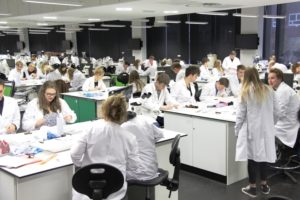
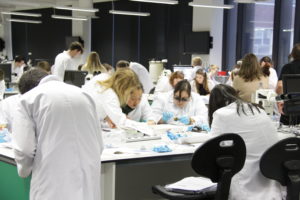
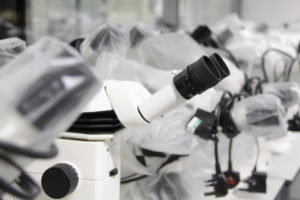
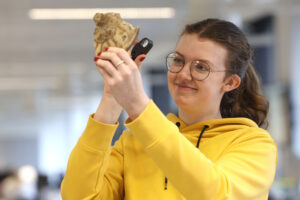
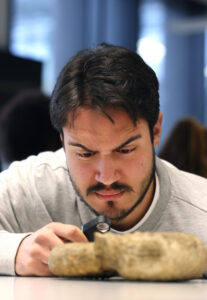

Hear about why studying an environmental science courses with the University of Liverpool is unlike anything else.
Discover what you’ll study, the facilities and resources you’ll have access to, and how we’ll prepare you for your future career.
From arrival to alumni, we’re with you all the way:

I picked Marine Biology because since school I had a great interest in biological sciences, but I was also interested in the ecology side and in the environment and conservation. This is a great course that combines all of those. The University has a great reputation for research-led teaching so you know that the work you’ll be doing will be really up-to-date.

Want to find out more about student life?
Chat with our student ambassadors and ask any questions you have.
Find out what life is like studying and living in Liverpool from current student Sam.
We produce highly employable marine biologists, trained in industry-relevant skills and modern equipment and software, and who can apply their knowledge to a wide range of fields including conservation, aquaculture, pollution and environmental monitoring.
Our graduates have a diverse range of careers in the following areas which include: the media, environmental consultancy, administration, academia, teaching, local and national government and international banking. Examples of recent graduate careers in the sector include: fisheries observers, surveyor, seabird research assistant, turtle conservation field leader, field assistant on mammal surveys, rangers and conducting environmental surveys for construction work. Many choose to continue their studies at master’s or PhD level on topics such as fish assemblages in mangroves, marine ecosystem responses to climate change and carbon sequestration in soils.
89.5% of environmental sciences students are in work and/or further study 15 months after graduation.
(Discover Uni, 2018-19.)
Hear what graduates say about their career progression and life after university.

Jess studied Ocean Science at the University of Liverpool and graduated in 2018. She is currently working as an Operational Meteorologist at the Met Office.
Your tuition fees, funding your studies, and other costs to consider.
Full-time place, per year - £9,535
Year in industry fee - £1,905
Year abroad fee - £1,430 (applies to year in China)
Full-time place, per year - £29,100
Year in industry fee - £1,905
Year abroad fee - £14,550 (applies to year in China)
The tuition fees shown are correct for 2025/26 entry. Please note that the year abroad fee also applies to the year in China.
Tuition fees cover the cost of your teaching and assessment, operating facilities such as libraries, IT equipment, and access to academic and personal support. Learn more about paying for your studies.
We understand that budgeting for your time at university is important, and we want to make sure you understand any course-related costs that are not covered by your tuition fee. This could include expenses such as field clothing and sustenance (food and drinks) during fieldwork.
Find out more about the additional study costs that may apply to this course.
We offer a range of scholarships and bursaries that could help pay your tuition and living expenses.
If you’re a UK student joining an undergraduate degree and have a household income below £35,000, you could be eligible for a Liverpool Bursary worth up to £2,000 for each year of undergraduate study.
Apply for an Asylum Seekers Scholarship and you could have your tuition fees paid in full and receive help with study costs. You’ll need to have applied for asylum in the UK, or be the dependant of an asylum seeker, and be joining an eligible undergraduate degree.
If you’ve spent 13 or more weeks in Local Authority care since age 14, you could be eligible for a bursary of £3,000 per year of study. You’ll need to be a UK student joining an eligible undergraduate degree and be aged 28 or above on 1 September in the year you start.
Are you a UK student with a Black African or Caribbean heritage and a household income of £25,000 or less? You could be eligible to apply for a Cowrie Foundation Scholarship worth up to £8,000 for each year of undergraduate study.
If you’re a UK student identified as estranged by Student Finance England (or the equivalent UK funding body), you could be eligible for a bursary of £1,000 for each year of undergraduate study.
Joining a School of Biosciences degree and have a household income of less than £25,000? If you’re a UK student, you could apply to receive £4,500 per year for three years of your undergraduate course.
Do you live in the Liverpool City Region with a household income of £25,000 or less? Did neither of your parents attend University? You could be eligible to apply for a Nolan Scholarship worth £5,000 per year for three years of undergraduate study.
Are you a UK student with a household income of £25,000 or less? If you’ve participated in an eligible outreach programme, you could be eligible to apply for a Rigby Enterprise Award worth £5,000 per year for three years of your undergraduate degree.
Are you a UK student with a household income of £25,000 or less? Did neither of your parents attend University? You could be eligible to apply for a ROLABOTIC Scholarship worth £4,500 for each year of your undergraduate degree.
Apply to receive tailored training support to enhance your sporting performance. Our athlete support package includes a range of benefits, from bespoke strength and conditioning training to physiotherapy sessions and one-to-one nutritional advice.
Joining a degree in the School of Electrical Engineering, Electronics and Computer Science? If you’re a UK student with household income below £25,000, you could be eligible to apply for £5,000 a year for three years of study. Two awards will be available per academic year.
If you’re a young adult and a registered carer in the UK, you might be eligible for a £1,000 bursary for each year of study. You’ll need to be aged 18-25 on 1 September in the year you start your undergraduate degree.
Use our handy chatbot for your Clearing enquiries.
Last updated 17 June 2025 / / Programme terms and conditions